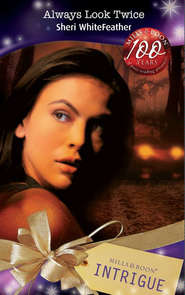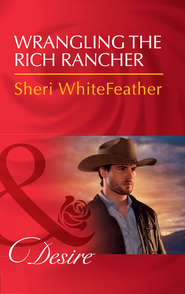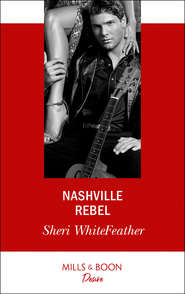По всем вопросам обращайтесь на: info@litportal.ru
(©) 2003-2024.
✖
The Ashtons: Walker, Ford & Mercedes: Betrayed Birthright / Mistaken for a Mistress / Condition of Marriage
Автор
Год написания книги
2019
Настройки чтения
Размер шрифта
Высота строк
Поля
“I was hitchhiking, and he picked me up. It was my second day on the road, and I wasn’t getting very many rides.”
“Is that the first time you left the rez?”
She nodded. “I was twenty-three years old, determined to get away from this place and never come back.”
“Where were you headed?”
“Omaha. I figured it was big enough to find a job and start my life over.”
“Did my dad offer to drive you there?”
“No. He offered to take me as far as Kendall, the town where he lived.” Her tone turned wistful. “You should have seen me when I climbed into his truck. Talk about nervous. He was so handsome, so tall and strong, with the greenest eyes imaginable.”
Curious, Walker studied her, noticed how girlish she seemed—a woman reminiscing about the man she loved. “I guess you never made it to Omaha, considering Charlotte and I were born in Kendall.”
“David offered me a job. He said he was looking for a housekeeper, someone to cook and clean for him and his farmhands. But later I discovered that he just wanted to keep me around.”
Walker couldn’t help but smile. His old man must have been quite the charmer. “Crafty guy.”
“And proud and kind. Everything I could have hoped for. I don’t think I’ll ever stop missing him.”
He glanced away, then frowned, his memories as tangled as the weeds spreading across the plains. “What happened on the day he died?”
“Your father had a heart attack behind the wheel. I was with him, riding in the passenger seat. We were on our way home from the mortgage company, trying to get them to discount the loan, but it was too late. They refused to work with us, to help us save the farm.”
“Did you try to take the wheel?”
“Yes, but I couldn’t. Everything happened so fast. We hit a tree. Between the heart attack and the accident, David didn’t stand a chance.”
“Charlotte and I were at a neighbor’s house. An elderly woman.” He remembered a gray-haired lady, but he couldn’t recall his own parents.
Mary blinked back tears. “She was a widow who used to baby-sit now and then. That’s where you stayed until Spencer came and got you.”
“What did my uncle tell her?”
“That he was going to care for my children until I was well enough to take you to the reservation. She had no reason to question his motives.”
As silence stretched between them, he placed his lemonade on the step. The glass had been sweating in his hand, making his palms damp. He wanted to comfort Mary, to abolish her pain, as well as his own. But he didn’t know how. He was still struggling to bond with her, to behave like her long-lost son.
“I should get started on dinner.” She stood and dusted off of her pants, looking old and tired.
He got to his feet, envisioning her when she was young, like the pictures he’d seen in her photo albums. “How do you say mother in Lakota?”
“Iná,” she told him.
“Iná,” he repeated.
Her breath hitched, causing a lump to form in his throat. “I’ll help you with dinner,” he said, even though he was a lousy cook.
She touched his cheek, her hand warm against his skin. They gazed at each other, but they didn’t embrace. Before things got too awkward, she led him into the kitchen, where she taught him how to make Indian tacos.
Walker was out of his element, but he did the best he could, trying to please his mother. By the time Tamra arrived on the scene, he was knee-deep in fried dough, lettuce, tomatoes and a pan of ground beef.
Tamra pitched in, and the three of them prepared the evening meal. But soon, he thought, they would be in Napa Valley. On the estate. The mansion where he was raised.
The place Walker called home.
Seven
The weather in Northern California was perfect, a warm summer day bursting with color. The wine country, with its fertile land and prospering grapes, was surrounded by mountain ranges that rose to the sky.
Tamra sat next to Walker in his car, a silver Jaguar he’d retrieved from a long-term parking lot at the airport. Mary settled in the backseat, but she’d been relatively quiet since they’d arrived in Napa Valley.
Walker stopped at a gate at the entrance of the estate, pressing a keypad with a security code. As they continued, moving closer to their final destination, Tamra drew a shaky breath.
The mansion itself, an enormous cream-colored structure accented with marble, presided from a hill overlooking the vineyards below. A large circular drive boasted an elegant reflecting pool. The water shimmered in the sun, catching the light like magic.
“Oh, my,” Mary said, a statement that seemed to convey exactly what Tamra was thinking.
Oh, my.
“The humble abode,” Walker joked, pulling into the driveway with ease.
He was glad to be home, Tamra thought. To the familiarity of his youth. But his comfort zone only made her more nervous.
To her, the estate seemed like a rich-and-powerful fortress. It had Spencer Ashton written all over it. The dead man still reigned.
“Long live the king,” she mumbled.
Walker shot her a quick glance. “What?”
“It looks like a castle,” she amended.
He shrugged and killed the engine of his sixty-thousand-dollar car. They climbed out of the Jag, and he gestured to the trunk, where he’d already popped open the lid. “Don’t worry about our luggage. Someone will take care of it soon enough.”
Someone? The hired help? “You’re spoiled,” Tamra said.
He frowned at her. “I don’t have servants in San Francisco. I prefer my privacy. But things are different here.”
She held her tongue, and he opened the door to an expansive foyer. A magnificent library was on the left and a lavish dining room on the right. A double staircase, leading to each wing of the house, made a sweeping impression. Walker escorted her and Mary into a majestic room he called the grand parlor.
Grand indeed: creamy fabrics and ornate antiques, a terrace that presented a breathtaking view of a flourishing garden and the vineyards below.
Tamra didn’t want to sit, although Walker offered her and his mother a seat. The furniture, she noticed, was polished to perfection. Tables gleamed and mirrors reflected every carefully decorated angle. There wasn’t a thread out of place. Even the tassels on pillows displayed themselves in a don’t-touch-us manner.
A woman wearing a black uniform draped with a white apron entered the parlor. She looked about Mary’s age, her long dark-brown hair pinned up.
“Mr. Walker,” she said, her tone soft and respectful. “It’s good to have you home. And with your new family.”











